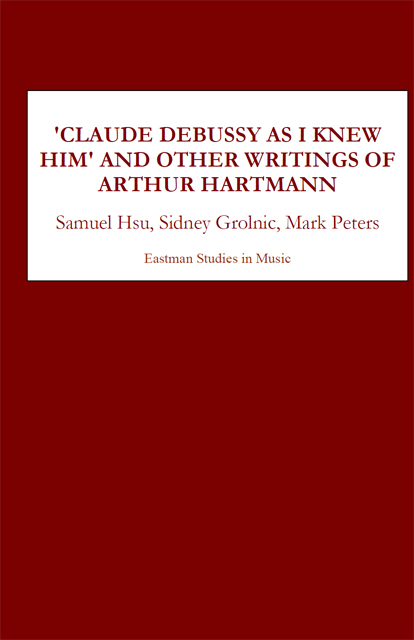Book contents
- Frontmatter
- Dedication
- Contents
- List of Photographs
- List of Facsimiles
- List of Music Examples
- List of Correspondence
- Foreword by David Grayson
- Preface
- Part 1 Arthur Hartmann
- Part 2 Claude Debussy
- Part 3 Other Writings of Arthur Hartmann
- Appendix A The Minstrels Manuscripts
- Appendix B Three Letters from Claude Debussy to Pierre Louÿs
- Arthur Hartmann: Catalogue of Compositions and Transcriptions
- Notes
- Archival Sources
- Bibliography
- Index
Memories of Masters of the Bow: An Impression of Joachim’s Last Years
Published online by Cambridge University Press: 17 March 2023
- Frontmatter
- Dedication
- Contents
- List of Photographs
- List of Facsimiles
- List of Music Examples
- List of Correspondence
- Foreword by David Grayson
- Preface
- Part 1 Arthur Hartmann
- Part 2 Claude Debussy
- Part 3 Other Writings of Arthur Hartmann
- Appendix A The Minstrels Manuscripts
- Appendix B Three Letters from Claude Debussy to Pierre Louÿs
- Arthur Hartmann: Catalogue of Compositions and Transcriptions
- Notes
- Archival Sources
- Bibliography
- Index
Summary
His Personality and Prejudices—Playing the Formidable Hungarian Concerto for Its Composer—Musical Experiences with Ysaÿe
Equipped with a letter of introduction from no less a personage than Ysaÿe, in which he presented me as “un artiste du premier ordre,” I went to Berlin with the purpose of becoming a pupil of the great Joachim. Arrived there, I sent it, together with one of my own in which I told the Meister that all my life it had been my goal to have the privilege some day of his advice when I should be sufficiently advanced in violin playing. I begged him now to appoint a time when I might come and play for him his own Hungarian Concerto, hoping that my playing merited being accepted as a pupil by him whom my father had always called “az Ur Isten” [Mister God Almighty]!
A Time of Venerable Figures
It is utterly impossible for the present generation even to imagine what music-study in those days in Germany meant, for they are totally lacking in veneration towards any teacher and live in an atmosphere that is far removed from the calm and old-world culture, notably that of the time of that venerable and historic figure, Joseph Joachim. During the seven or eight years of my residence in the Prussian Capital, Richard Strauss, Muck, and Blech were all active as conductors at the Royal Opera House, with Weingartner conducting the Opera House concerts and Nikisch the Philharmonic. Joachim was Director of the Royal High School for Music, with Haliø, Wirth, Moser, and others as sub-teachers of the violin, and Humperdinck and Bruch in the composition department. Busoni, Scharwenka, Hekking, d’Albert, Godowsky, Carreño, and yet a score of great and celebrated artists made Berlin their home, and with six or eight concerts nightly, by artists from all over the world, it was the usual thing to hear three or four of the great violinists, and an equal number of celebrated pianists and singers, within any fortnight. New York City today has become the same kind of music world center, yet living is so incomparably different that to explain the manifold reasons therefor and the effects thereof would require an especial dissertation of its own.
- Type
- Chapter
- Information
- Publisher: Boydell & BrewerPrint publication year: 2004

